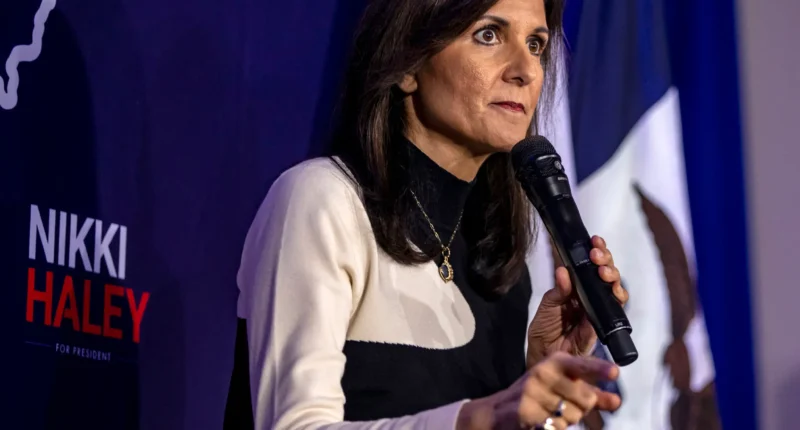Prominent Democratic donors, anxious about the increasingly authoritarian language of Donald J. Trump, have been calling on Democratic voters and independents to thwart the former president’s comeback by voting for Nikki Haley in open Republican primary elections.
But Ms. Haley’s political gaffe on Wednesday night, when the presidential hopeful and former governor of South Carolina stumbled through the causes of the Civil War with no mention of slavery, may make that appeal considerably harder just as she is edging closer to striking distance of Mr. Trump in New Hampshire.
Ms. Haley on Thursday walked back her answer about the causes of the Civil War, telling a New Hampshire interviewer, “Of course the Civil War was about slavery.”
Her retreat came about 12 hours after a town-hall meeting in Berlin, N.H., a state that is central to her presidential ambitions, where she was asked about the Civil War’s origins. Her answer focused on government overreach and “the freedoms of what people could and couldn’t do,” after she jokingly told the questioner he had posed a tough one. He then noted that she had not uttered the word “slavery.”
“What do you want me to say about slavery?” Ms. Haley replied. “Next question.”
Democrats savaged her answer. The Democratic National Committee called her comments “vile” and her cleanup efforts “pathetic.” Late Wednesday night, even President Biden rebuked her: “It was about slavery,” he wrote on social media.
All of that came a month after Jamie Dimon, the chief executive of JPMorgan Chase and a prominent Democratic donor, threw his support behind Ms. Haley, and implored other donors at The New York Times’s DealBook Summit, “Even if you’re a very liberal Democrat, I urge you, help Nikki Haley, too.”
Reid Hoffman, the billionaire co-founder of LinkedIn and a major Democratic donor, gave $250,000 to a super PAC supporting Ms. Haley.
With recent polls showing Ms. Haley surging into second place in New Hampshire, her crossover appeal is becoming more relevant, for independents and for Democrats who might have registered as independents to vote in the Republican primary on Jan. 23, the first in the nation. To win the Granite State contest, she will most likely need those voters, just as Senator John McCain of Arizona did when he upset George W. Bush in the state’s 2000 primary.
“If Democrats believe Republicans should hold their noses and vote for Joe Biden for the sake of democracy, they can model that in New Hampshire by crossing over and holding their noses to vote for Haley in the G.O.P. primary,” said Ian Bassin, a democracy advocate who recently won a MacArthur Foundation “genius” grant for his work. “Not because she’s a good candidate — she’s not — but because Donald Trump is an existential threat to America and any vote to stop him is a service to the country.”
Ms. Haley did not help that cause this week. Speaking on the radio show “The Pulse of New Hampshire” on Thursday morning, Ms. Haley, who famously removed the Confederate battle flag from the grounds of the South Carolina Capitol in Columbia, tried to make amends: “Yes, I know it was about slavery. I am from the South.”
But she also insinuated that the question had come not from a Republican voter but from a political detractor, accusing Mr. Biden and Democrats of “sending plants” to her town-hall events.
“Why are they hitting me? See this for what it is,” she said, adding, “They want to run against Trump.”

Her Civil War comments did not go away. By Thursday afternoon, the campaigns of all of her rivals for the Republican nomination, including Mr. Trump and Gov. Ron DeSantis of Florida, had slammed her gaffe. Mr. DeSantis, who clashed with rivals over the summer about Florida’s educational standards for the teaching of slavery, accused her of having “some problems with some basic American history.”
He said, “It’s not that difficult to identify and acknowledge the role slavery played in the Civil War.”
Our politics reporters. Times journalists are not allowed to endorse or campaign for candidates or political causes. That includes participating in rallies and donating money to a candidate or cause.
The campaign of former Gov. Chris Christie of New Jersey, the field’s most outspoken critic of Mr. Trump, promised to keep her Civil War answer front and center. “She didn’t say what she said last night and today about this because she’s dumb,” Mr. Christie said on Thursday night at a campaign event in Epping, N.H. “She’s not, she’s smart, and she knows better.” He added, “The reason she did it is just as bad if not worse, and she got everybody concerned about her candidacy. She did it because she’s unwilling to offend anyone by telling the truth.”
Ms. Haley’s allies rushed to her defense. Tom Davis, a Haley surrogate and Republican state senator in South Carolina, said he understood “sharp elbows and rough questions” were part of any presidential campaign but argued that her critics had no place schooling Ms. Haley, an Indian American woman raised in the rural South, on racial division, racism and slavery.
“This space right here is where Nikki Haley needs no defending,” he said, pointing to her historic victory as the first woman of color to lead the state.
Ms. Haley’s remarks echoed a 150-year-old argument from segregationists that the Civil War was fundamentally about states’ rights and economics, not about ending slavery. “I think the cause of the Civil War was basically how government was going to run,” she said on Wednesday night, “the freedoms and what people could and couldn’t do.”
She tried to walk back that interpretation on Thursday, asking: “What’s the lesson in all this? That freedom matters. And individual rights and liberties matter for all people. That’s the blessing of America. That was a stain on America when we had slavery. But what we want is never relive it. Never let anyone take those freedoms away again.”
Some Democrats implored potential crossover voters to stay with Ms. Haley as the most plausible alternative to Mr. Trump. On Thursday, the Trump campaign released a new television advertisement with the kind of fear-mongering and violent imagery that Democrats promoting Ms. Haley have denounced, warning of “the possibility of a Hamas attack” on the United States.
“The 2024 election is about Donald Trump, whose promised governing strategy is political violence and retribution,” said Dmitri Mehlhorn, a prominent Democratic donor and finance executive with close ties to Mr. Hoffman. “If we really want to stop him and his MAGA allies who instigated and still defend Jan. 6, we have to swallow hard and team up with anyone who can beat them.”
Ms. Haley’s appeal as a candidate of moderation is mixed. As governor of South Carolina, she signed some of the harshest immigration and anti-abortion laws in the country at the time, as well as a stringent voter identification law that required photo ID at the ballot box.
But she also blocked a bill to stop transgender youths from using bathrooms that corresponded to their gender identity and drew national acclaim for her push to lower the Confederate battle flag after a white supremacist opened fire and killed nine Black worshipers at a Charleston church, including a beloved state senator, in 2015.
Now, on the campaign trail, she has sought to strike a softer tone on her record and some of the thorniest issues facing her party, trying to thread the needle on abortion and casting herself as a mother and daughter of immigrants who is prepared to help turn the page on the nation’s era of divisive politics.
“Haley’s refusal to talk honestly about slavery or race in America is a sad betrayal of her own story,” said Representative Ro Khanna, Democrat of California.
Still, several Democratic state lawmakers who worked with her on the effort to remove the flag, said they saw parallels between her remarks this week and those she made in a 2010 interview with Confederate heritage group leaders, in which she argued that the Confederate flag was “not something racist” but about tradition and heritage. In that exchange, she also said she could leverage her identity as a minority woman to fend off calls to boycott the flag.
After the church shooting shook South Carolina, Ms. Haley seized on the newfound political will among state lawmakers on both sides of the aisle, spurring accusations from some that the heavy lifting to remove the flag had taken place in the State Legislature.
“If she hadn’t supported the flag coming down, yeah, it would have been much harder to get it down — I think that’s true,” said Vincent Sheheen, a former Democratic state senator in South Carolina who unsuccessfully ran against Ms. Haley in 2010 and 2014. “But the key was kind of putting her in a box where she had to support a club.”
Mr. Davis, the Haley ally who was elected in 2008 and was serving in the State Legislature at the time, argued that it was Ms. Haley who helped frame the debate as a matter of “reciprocal grace,” telling him and others that the forgiveness the families of the victims had shown the killer was an act that needed to be returned.
“To say it would have happened without her, to minimize her role — that is not just right,” he said, recalling the political blowback she faced over the decision. “It was not a safe political position for her to take, especially in the Republican Party.”






